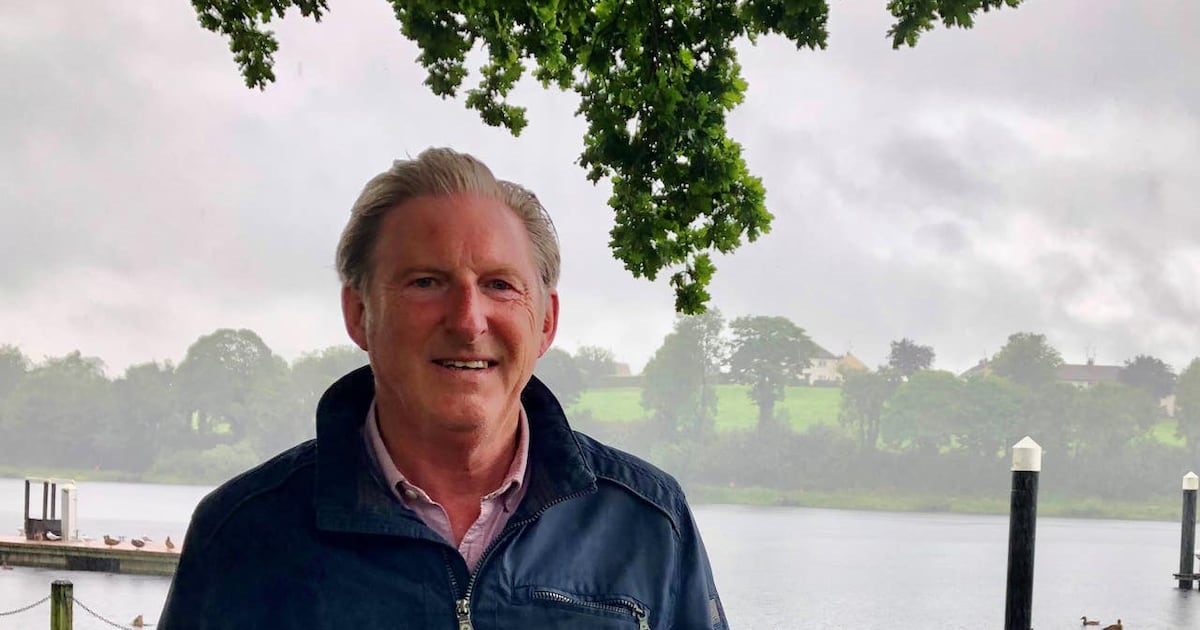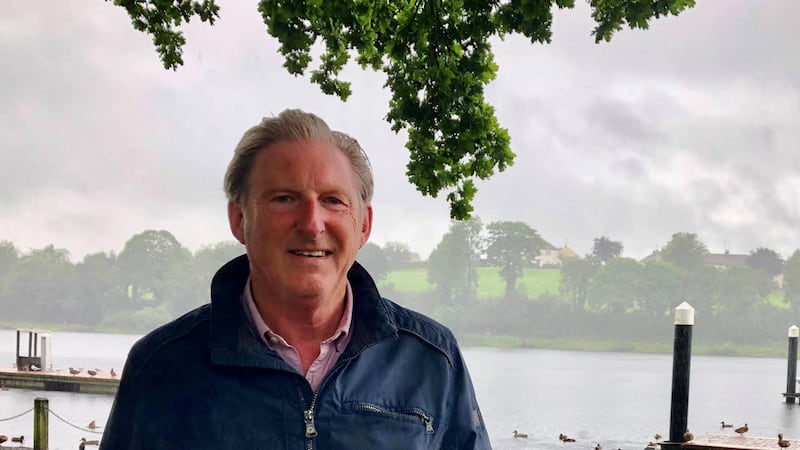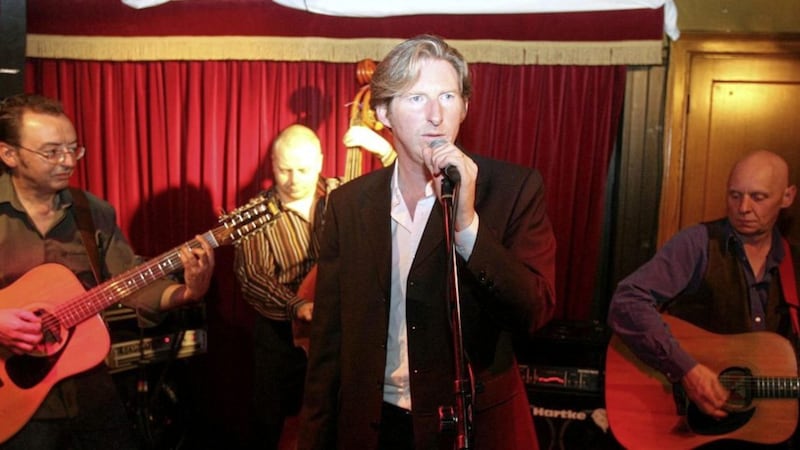As a young boy growing up in Enniskillen in the 1960s, Adrian Dunbar absorbed all manner of television programmes on BBC and ITV.
“That child’s glued to the telly, as my ma used to say,” Dunbar recalls. “I used to watch everything. So, imagine the idea that I ended up through great fortune creating an iconic character on British TV.”
Dunbar has had an illustrious career in film, television and theatre playing a variety of roles over more than four decades, but it is his portrayal of Ted Hastings hunting down “bent coppers” in Line of Duty that many will immediately identify with.
He captures Hastings’ character perfectly, the steely determination, almost a hint of menace behind his integrity. People are comforted that the good guy comes through even though Hastings isn’t exactly a bundle of fun.
By contrast the off-screen Dunbar is likeable and engaging. He allies a sharp mind with humour and is sociable and talkative. It makes for lively conversation about his life and career; living in London he still keeps the link with his beloved Enniskillen “big time”.
His deep roots and the people and place are important to him. He gets them.
The affection is mutual, and locals are proud of one of their own. In the town centre of Enniskillen, a large mural depicts a drawing of Dunbar as Hastings alongside the wording “Now we’re sucking diesel” the phrase the actor introduced into the script.
Four of his six siblings still live there, and he recounts in fine detail his “idyllic” upbringing, his schoolfriends and those who helped him on a career path.
He’s patron of the town’s Aisling Centre, which he believes does really important, much-needed work in mental health and he supports Enniskillen Gaels, attending the plan to develop Brewster Park by “a really forward-thinking and inclusive club”.
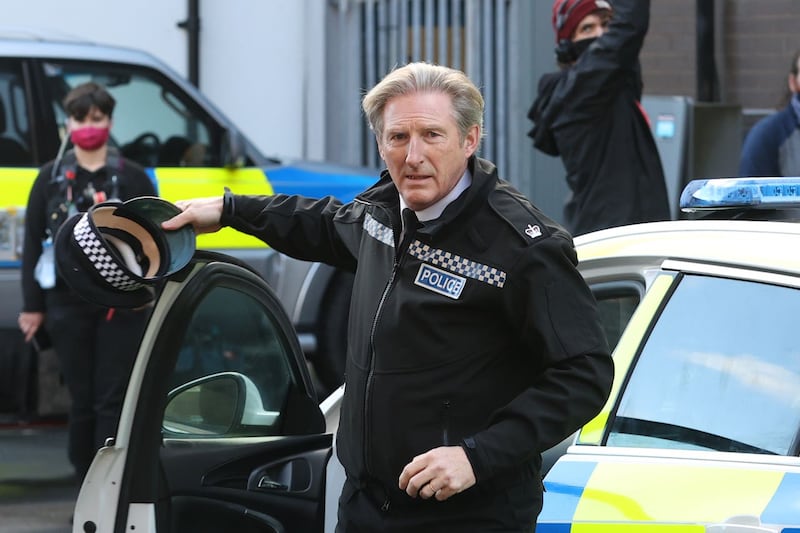 Adrian Dunbar on the set of the sixth series of Line of Duty (Liam McBurney/PA)
Adrian Dunbar on the set of the sixth series of Line of Duty (Liam McBurney/PA)
But a bit of the Hastings integrity and desire for justice comes through too as he talks about people in Northern Ireland becoming politicised by division and returns often to the theme of housing being symptomatic of the ills of society
He’s dismayed that a lot of the north’s problems and the failures of the State could have been addressed much earlier by the Unionist establishment.
He believes there were several moments in earlier years that things “could have been sorted out” but Unionism failed to grasp the opportunity. He recalls with sadness the “despicable act of violence that was the bomb in Enniskillen in 1987”.
Dunbar warms to the talk of constitutional change and insists “partition doesn’t work” and he becomes enthusiastically positive about his admiration for James Connolly’s vision for Ireland.
The boy who grew up in Enniskillen admits that in his younger days, there was no thought of identity politics, and he says, “Our home in Castle Street was in close proximity to the lake and the castle and my earliest memory is wandering round the area with my father and brother John. It was a very tight community and walking along the street, guys would pat you on the head and call you by name, even though you didn’t know who they were.
“The lake and the playing fields were the centre of my life, and we were all interested in boats and fishing. Sport was also really important, and people were very, very close,” he says.
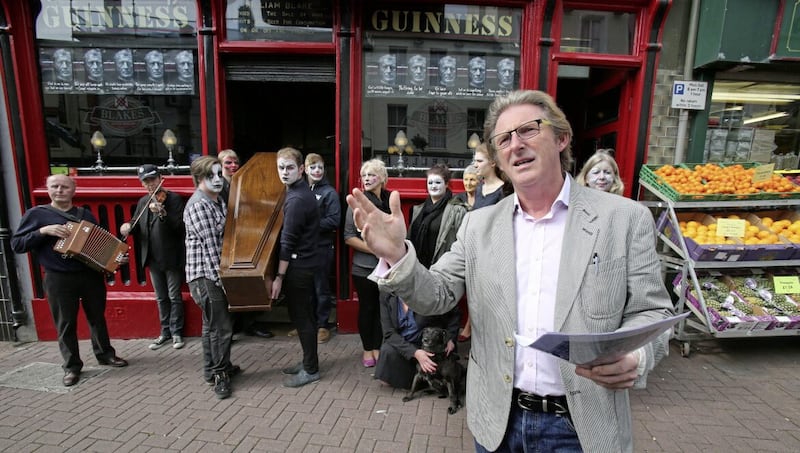 Adrian Dunbar has been a long-time supporter of and participant in Enniskillen’s Happy Days festival. Picture by Paul Faith
Adrian Dunbar has been a long-time supporter of and participant in Enniskillen’s Happy Days festival. Picture by Paul Faith
“It really was a fantastic place to grow up,” says Dunbar whose family then moved to Cornagrade, a mixed estate and he rhymes off the names of protestant and catholic families.
Such is the complexity of identity that, although from a catholic background, Dunbar recalls sleeping in the attic in Castle Street alongside the framed embroidered colours from the “Skins” the nickname for the Inniskillings Regiment in which his maternal great-grandfather served as regimental sergeant major and later his grandfather as colour sergeant.
The island town of Enniskillen has better community integration than most in the north and Dunbar says in his younger days, “Identity politics didn’t really come into it.”
But, he adds, that Bloody Sunday was a watershed moment.
“Even before that, the subject of housing was the big issue,” he says. “It’s really interesting that housing is central to keeping a democracy together. Giving people somewhere to live is really important,” he says and when this and other issues weren’t resolved “everything got polarised.”
“You started to realise there were two sides. You kind of realise early on that when you were five years of age, somebody who you were playing with was not going to the same school as you. It came as a shock,” he recalls. “Even at five years old, this is something that resonates quite deeply.”
He adds: “If you wanted to set up a country that was dysfunctional, the first place to start would be to separate people on the grounds of religion. Once you do that, you introduce fear into the equation.”
The young Dunbar would come face-to-face with that fear in the early 1970s. With little work in Enniskillen, his father Sean sought employment in his native Portadown and brought the family to live in Churchill Park on the Garvaghy Road.
It was the period of the Ulster Workers Council strike and Dunbar recalls a “very, very scary time” for the catholic family with tartan gangs of loyalists wrecking the town centre and threatening to destroy the nationalist area where he lived.
Protestants from his area and catholics from Brownstown were exchanging houses to get into the safety of the silos of their own communities.
More segregation, more housing issues.
“That was scary to see a whole society falling apart. It was really disconcerting to see sectarian violence with people being shot for simply being a catholic or a protestant.
“Throughout that process, you became politicised. I think everybody did,” he says. “People talk about perceived sectarianism but there was real sectarianism, and it started with housing.”
“Housing, housing, housing,” he muses. “If somebody had realised when Austin Currie sat in that house in Caledon all those years ago, by making the distribution of housing more equitable, that would have defused something.”
But, he says, with a clear tone of regret, “No, that wasn’t going to happen.”
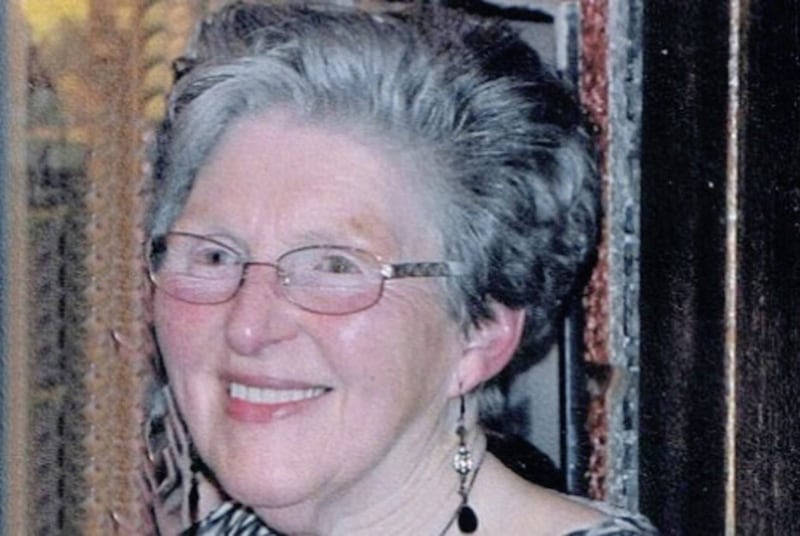 Co Fermanagh-born actor Adrian Dunbar’s mum Pauline
Co Fermanagh-born actor Adrian Dunbar’s mum Pauline
He believes it’s a tragedy that the British government and unionism weren’t able to face down loyalism, and says, “The fact is it did drag on and lots more people died before we came to the Good Friday Agreement.
“I remember being bundled into the car late at night with my brother and sisters and being brought back to stay with our cousins, the Clearys,” he recalls. Dunbar is a first cousin of the ex-Glentoran and Northern Ireland soccer international, Jimmy Cleary.
“We got back to Enniskillen and we thought, ‘please, please can we just come back here’,” he says, and it was a “huge relief” when he settled back into St Joseph’s College, alongside old friends such as Paul Keenan and the McClintocks.
“I felt, ‘we’re home. This makes sense’. We were a big extended family and it was great to get back to the town,” says Dunbar.
As it turned out, there was something providential in his return, with circumstances helping his undoubted talent to set him on a path to stardom.
The Fermanagh Council of the day put great emphasis on the arts and built the Ardhowen “Theatre by the Lakes” and Dunbar enjoyed helping Marty Quinn with the lights and his cousin Imelda McLernon with the box office.
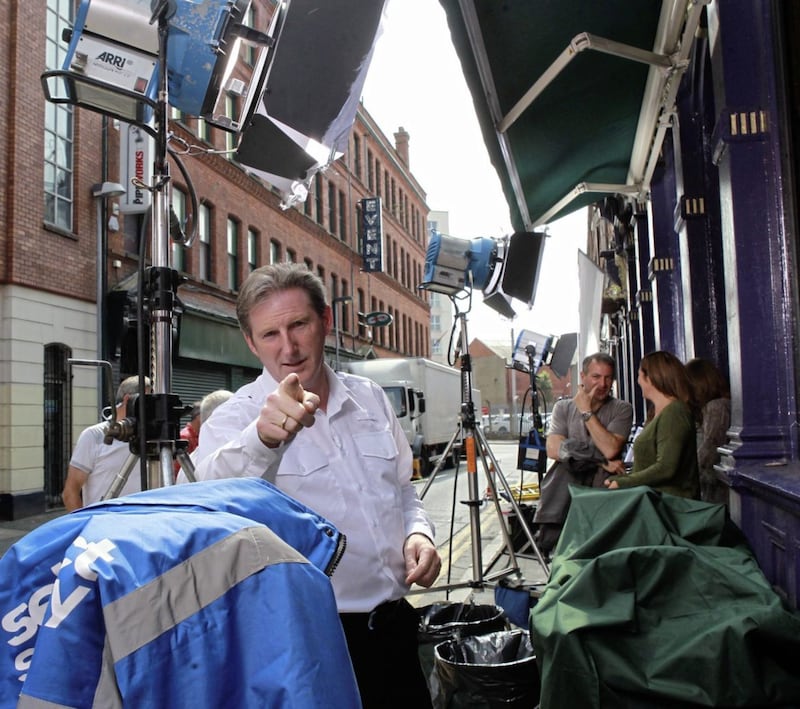 Adrian Dunbar filming Line of Duty in Belfast in 2017. Picture by Hugh Russell
Adrian Dunbar filming Line of Duty in Belfast in 2017. Picture by Hugh Russell
He helped out with local drama group St Michael’s and the Enniskillen Amateur Dramatic Society.
“Then I was asked to do a play,” he says. “I did it and people said, ‘you’re quite good’. That made me realise that the arts were a space where age, colour or religion didn’t matter. It was whether you could do it or not and whether you loved it or not.”
The fact that Dunbar could do it was recognised.
“We were really lucky at that point because the council had the foresight to appoint an arts officer, Janet Pierce, who wrote to the Guildhall School of Music and Dance and got me an audition.”
The rest, as they say, is history.
He recalls: “I was heading off to what is now recognised as one of the top five music and drama schools in the world. I’m still working with the Guildhall as an alumnus to this day.
“They made me a Fellow recently which I’m really proud of.”
The actor is still at the top of his game, and says: “I’m 67 now and really happy in the place I’m in. I’m working with some wonderful people, and I’ve got a lot of input into what I do. It’s very satisfying to see ideas you have coming to fruition.”
As the interview finishes, I thank him for taking time from a hectic schedule and for being so open about a range of topics.
“Ah wee buns,” says Dunbar, who loves an Ulster turn of phrase.
